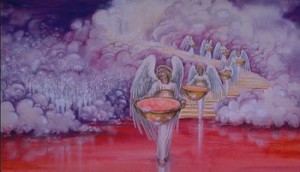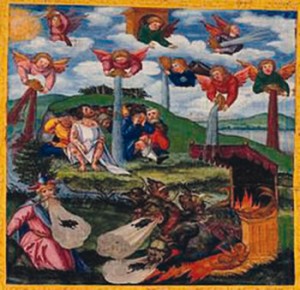The Book of Revelation (6) Chapters 15 and 16
Chapter 15 of Revelation begins with mighty praise of God. John sees a “sea of glass mixed with fire,” another image in which John stretches our imaginations. This sea functions as a sort of heavenly Red Sea through which the martyrs have passed. The martyrs play harps and sing “the song of Moses…and the song of the Lamb.” Note that this is one song not two, with the Israelites’ song of deliverance and victory over Pharaoh (Exodus 15:1-21) forming the basis for the martyrs’ song of deliverance and victory through Jesus the Lamb. Though Satan has already been conquered, he is still active on earth. As we read in 12:10-11 at the time of Satan’s being cast down to earth, “Then I heard a loud voice in heaven, proclaiming, ‘Now have come the salvation and the power and the kingdom of our God and the authority of his Messiah, for the accuser of our comrades has been thrown down, who accuses them day and night before our God. But they have conquered him by the blood of the Lamb and by their word of testimony, for they did not cling to life even in the face of death.’”
We have mentioned several times that Revelation is replete with biblical allusions. This is well illustrated in the hymn (15:3-4). In this beautiful hymn there are numerous allusions to the Psalms (86:9; 92:5; 139:14; 145:17). The book of the prophet Isaiah also supplies a number of allusions (2:2-4; 6:3; 60:1-3; 66:18-19). Other allusions drawn from the prophets include Malachi 1:11 and Jeremiah 10:6-7, in which the prophet taunts other so-called divine beings: “There is none like you, O LORD; you are great, and your name is great in might. Who would not fear you, O King of the nations? For that is your due.” And allusions are drawn from other Old Testament books, for example, Genesis 17:1 and 1 Samuel 2:2.
Before leaving our discussion of the hymn, we should note again that the purpose of God throughout Revelation is not the destruction of the nations (non-believers) but their conversion, so that they too can join the heavenly chorus (verse 4): “All nations will come and worship before you, for your judgments have been revealed.” Revelation says God’s deepest desire is the redemption of all peoples and nations.
John next shifts our attention to the opening of the “temple of the tent of witness in heaven.” Moses had been given instructions about the building of this portable shrine built according to a heavenly pattern (Exodus 25:9). In Exodus 40 we are told of the actual building of this portable shrine. In heaven John sees the heavenly counterpart of this tabernacle, and it is open. From the heavenly temple, John sees a liturgical procession of seven angels “robed in pure bright linen, with golden sashes across their chests. Then one of the four living creatures gave the seven angels seven golden bowls full of the wrath of God.” The angels wear bright linen, suitable for the garments of priests. Also they wear golden sashes across their chests as did the Son of Man (1:13). Back in chapter 5, the living creatures held bowls full of incense. From those bowls smoke carried up the prayers of the saints before the Lamb. In chapter 15, John uses a different image – the bowls carry the Lord’s wrath that will be poured out upon the earth. As at the dedication of the portable tabernacle by Moses (Exodus 40:34-38) and again as at the dedication of the Temple by Solomon (1 Kings 8:10-11), smoke fills the tabernacle. The smoke means that the angels cannot turn back until they have poured out the bowls of God’s wrath.
The seven bowls are filled with Exodus imagery. The first angel pours his bowl and a “foul and painful sore” comes, not on all humanity, but on all who bear the mark of the beast. John is warning his fellow Christians not to follow the ways of the beast. Plagues one, five, six and seven are all directed to Rome and those who follow the empire’s ways. This plague echoes Exodus 9:10-11.
The second angel pours his bowl into the sea, which becomes like the blood of a corpse. The third angel pours his bowl upon the fresh water. Now those who shed the blood of the martyrs are given blood to drink. Note that God’s judgment is not a life for a life. Both these plagues echo Exodus 7.
The fourth plague, scorching heat, is the counterpart to 7:16, where God’s faithful are promised that “the sun will not strike them, nor any scorching heat.” Even in face of all this judgment, the afflicted don’t repent. The people curse God rather than repent.
The fifth angel pours out his bowl upon “the throne of the beast” (Rome). We hear an echo of Exodus 10:21. The sixth angel pours his bowl on the great river Euphrates. It dries up the river making it possible for an invasion from the east. Evil will make its stand against God at a place called Harmagedon. Foul spirits that look like frogs lure the kings of the earth to a battle against God Almighty. Harmagedon is a Hebrew word and is best translated “the mountain of Megiddo.” Actually Megiddo is not a mountain, but is located on a plain. Old Testament references (Judges 5:19; 2 Chronicles 35:22) point to Megiddo as a place of destruction for those who oppose God. But “the battle of Armageddon” will not begin until 19:19.
The seventh angel pours out his bowl on the air. Ancient people believed the air between earth and sky was filled with demons, gods and spirits. The cycle of the bowls concludes with a hailstorm of enormous proportions. This echoes Exodus 9:22-26. The great city Babylon/Rome is defeated. But John’s emphasis is not on what happened to Rome, but rather the important question, “When will people repent?”
Next month: Revelation 17:1-19:10



 Entries(RSS)
Entries(RSS)